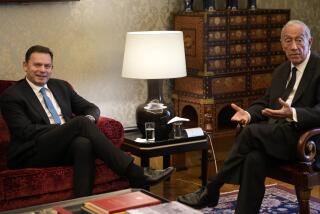Portuguese Elect Soares as President
- Share via
LISBON — Socialist Mario Soares, counted out of Portuguese politics by many analysts only four months ago, climaxed an extraordinary comeback Sunday by defeating a favored conservative candidate to become the first civilian president of Portugal in 60 years.
In an extremely close race, Soares, 61, a prime minister three times and the best known Portuguese politician outside Portugal, defeated Diogo Freitas do Amaral, 44, a law professor and Christian Democrat.
Official returns from all but 74 of the country’s 4,138 precincts gave Soares 3,000,663 votes, or 51.37% of the total, and Freitas do Amaral 2,841,054 votes, or 48.63%.
The results proved again that the voters of Portugal, an impoverished country that overthrew a dictatorship almost 12 years ago, still feel too leftist to accept a conservative leader, no matter how modern his image.
In a victory statement, Soares, who had fought the old dictatorship for many years, said that the election, in which both candidates were civilians, marked “the end of the transitional phase of democracy in Portugal.”
Using conciliatory tones, Soares said he intends to act as “a force for political stability and social peace.” He insisted that he will no longer look on himself as a Socialist leader, but “I will be the president of all the Portuguese.”
The defeat of Freitas do Amaral was a defeat as well for Prime Minister Anibal Cavaco Silva, who had campaigned alongside Freitas do Amaral and whose centrist Social Democratic Party had organized most of the conservative’s rallies. Cavaco Silva had insisted that only the election of Freitas do Amaral could ensure stable government for Portugal.
Although the prime minister is the most powerful executive under the Portuguese system, the president still has important powers, especially when a prime minister loses majority support in the Assembly of the Republic. The president can then dismiss the prime minister and either choose a new one or call new parliamentary elections. Cavaco Silva, whose party controls only 88 of the 250 seats in the assembly, must now face an unfriendly president who may be waiting for him to falter.
In a news conference after the Soares victory, Cavaco Silva seemed to caution the new president against moving against him. “The vote shows that almost 50% of the people of Portugal are for change,” he said. “We should not disillusion them.
“It would be a pity for our country,” he went on, “if our term of office is short.”
But, on a less defensive note, he said, “I will do all in my power to have no conflict with the president. . . .”
The relations between the two men have been tense. Cavaco Silva’s withdrawal from a coalition with Soares led to parliamentary elections in October that knocked the Socialist Party out of its position as the strongest party in the assembly. The defeat was so crushing that many analysts thought that Soares’ political career was over.
At the beginning of the year, polls showed Soares far behind a string of candidates for the presidency with little chance of surviving to the second round. He won 25.43% of the vote in the first round, far behind the 46.31% of Freitas do Amaral but enough to take second place and enter the runoff.
Even then, many analysts doubted that Soares, a traditional enemy of the Communists, could unite the left behind him. But Communist leader Alvaro Cunhal, putting aside his bitterness over Soares’ role in preventing the Communists from taking control of Portugal after the April 25, 1974, revolution, gave Soares a grudging endorsement.
Enough Communists heeded Cunhal to ensure the Soares victory.
Soares, a personable campaigner, also managed to awaken some disquiet among moderate voters about the rightist support of Freitas do Amaral. These voters were probably not as impressed with accusations about his ties to the dictatorship of Antonio Oliveira Salazar as they were by a fear that some old Salazar supporters were counting on a Freitas do Amaral victory to restore old privileges.
Soares will be the first civilian president of Portugal since the 1926 military coup that led to the Salazar dictatorship.
More to Read
Sign up for Essential California
The most important California stories and recommendations in your inbox every morning.
You may occasionally receive promotional content from the Los Angeles Times.












